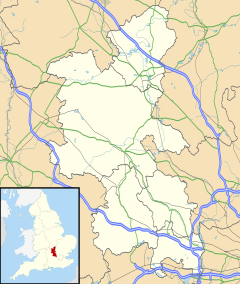Whaddon, Buckinghamshire
| Whaddon | |
|---|---|
| Whaddon shown within Buckinghamshire | |
| Population | 533 (2011 Census) |
| OS grid reference | SP805340 |
| Unitary authority | |
| Ceremonial county | |
| Region | |
| Country | England |
| Sovereign state | United Kingdom |
| Post town | MILTON KEYNES |
| Postcode district | MK17 |
| Dialling code | 01908 |
| Police | Thames Valley |
| Fire | Buckinghamshire |
| Ambulance | South Central |
| EU Parliament | South East England |
| UK Parliament | |
Whaddon is a village and also a civil parish within Aylesbury Vale district, in Buckinghamshire.
The village name is Anglo Saxon in origin, and means 'hill where wheat is grown'. The village is referred to several times in the Anglo-Saxon Chronicle generally in the form of Hwætædun.
The village is at the centre of the ancient Whaddon Chase, the site for many centuries of royal hunting lands. Whaddon Chase is designated an area of 'Special Landscape Interest'.
Whaddon Church of England School is a mixed Church of England primary school. It is a voluntary controlled school, which takes children from the age of four through to the age of eight. The school has approximately 50 pupils.
Whaddon Hall, (the village manor) was once home to the Selby family (also known as Selby-Lowndes), whose ancestor William Lowndes built the larger and grander Winslow Hall. Both mansions are still private houses.
During World War II Whaddon Hall served as headquarters of Section VIII (Communications) of MI6, under the command of Brigadier Richard Gambier-Parry. The "Station X" wireless interception function was transferred here from Bletchley Park in February 1940. That facility served in a number of capacities, the most critical the sending of Ultra intelligence from Bletchley Park to officers in the field. The term Ultra was used to convey the status of the intelligence which was considered to be above Top Secret. It consisted of information that was gathered by breaking encrypted radio communications. At the time that France fell to the Axis Powers in June 1940, only a small number of SIS agents were in communication with Whaddon Hall. Early in the war, until about 1941, inexperienced SIS agents on the European continent spent too much time on the air, and jeopardised their security. However, by 1943, Gambier-Parry and his staff had engineered a substantial improvement in clandestine wireless communication. The covert wireless network that Gambier-Parry established allowed him to stay in communication with SIS agents in many countries.
...
Wikipedia

